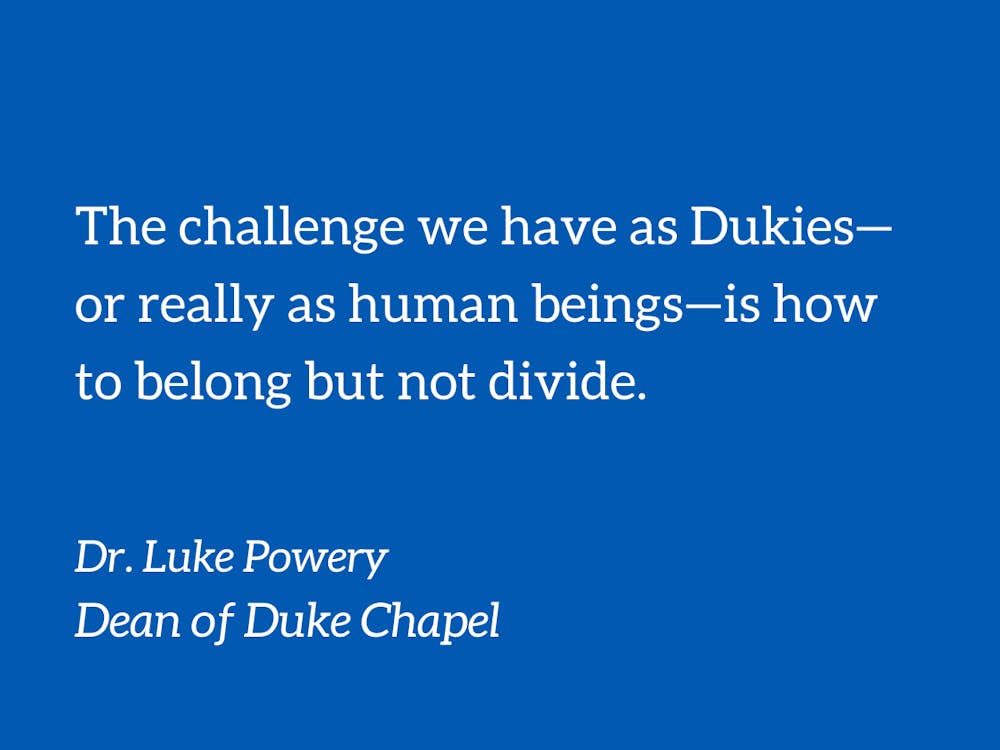With the spring semester ramping up, students are joining, and reconnecting with, all kinds of groups—clubs, residence halls, study circles, classes, sports teams, religious groups, fraternities, sororities, and more. This has a good and natural foundation: We all long to belong. We desire community and connection. We want to be known and loved. The challenge we have as Dukies—or really as human beings—is how to belong but not divide.
Belonging, though an overused term these days, is important, and to what and whom we belong shapes our identity since none of us are self-created. We belong to certain families and their histories. We belong to different ethnic groups. Where we belong is often where we long to be.
But there are pitfalls that come along with belonging. When you’re attached to a group or idea, you may not always be open to otherness or different perspectives. It doesn’t have to be that way, but it can. Your arena of belonging could function as a barricade to difference and only be an enclosed enclave.
There is an example of this that comes to mind as I am working on a sermon. It occurred back in the first century of the Common Era (AD) in the ancient city of Corinth, which was then part of the Roman Empire and is now part of Greece. This was the site of one of the first Christian churches. With the zeal of new converts what do you think these early Christians were doing? Arguing!
We know this because of the letter the Apostle Paul wrote to a church at Corinth in response to reports that they were having quarrels and divisions due to belonging. In that letter (1 Corinthians) we learn that some at the church say, “I belong to Apollos” while others say, “I belong to Cephas,” while others say, “I belong to Christ.” These people that are supposed to be united, are actually divided based on their allegiance to whom they belong. They can’t see eye to eye or feel heart to heart. They’re entrenched in their tribes.
These divisions are in contrast to another example from the Bible that is also on my mind because it is central to my new book Becoming Human: The Holy Spirit and the Rhetoric of Race. That example is the Day of Pentecost when the Holy Spirit empowers the first Christian disciples to speak to a crowd comprising people from many different cultures and tribes of the ancient Middle Eastern world (“Parthians, Medes, Elamites, and residents of Mesopotamia, Judea and Cappadocia, Pontus and Asia, Phrygia and Pamphylia, Egypt…”). Instead of erasing the cultural diversity of all these people, the miracle is that each member of the crowd hears the message in their own language.
Here's how I describe the event of Pentecost in my book: “The power to witness in the Spirit is a power to interact beyond oneself in order to expand racial-ethnic and cultural engagement across the typical racialized segregational silos. The Spirit’s power is for an expansion in how we relate to and with diverse others such that our social borders are broadened in the vast vision of God.”
From these two examples from the early church, we can see how our entities of belonging can foster or disrupt better human relationships across differences—cultural, ethnic, religious, political, economic, etc. And so, my hope as we begin this semester is that we will be more like the people who were unified in their diversity on the Day of Pentecost and less like the people who were bickering in Corinth. Let’s have less of only knowing and caring for our tribe of belonging—“my people” as some often say— and more marveling in the vast beauty of diverse human beings in the world.
The Rev. Dr. Luke A. Powery is Dean of Duke University Chapel. His column runs on alternate Mondays.
Get The Chronicle straight to your inbox
Signup for our weekly newsletter. Cancel at any time.

